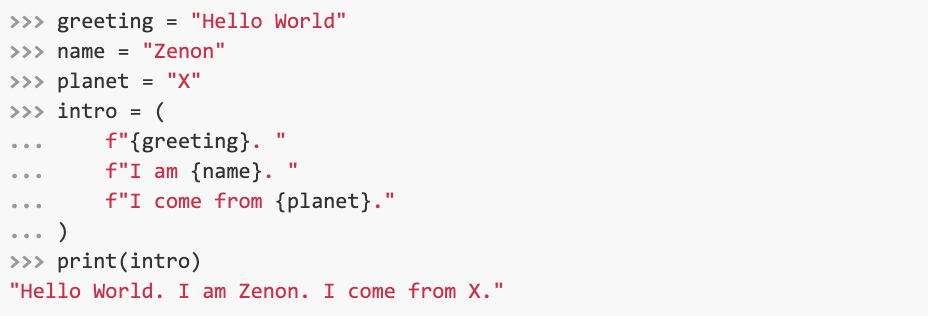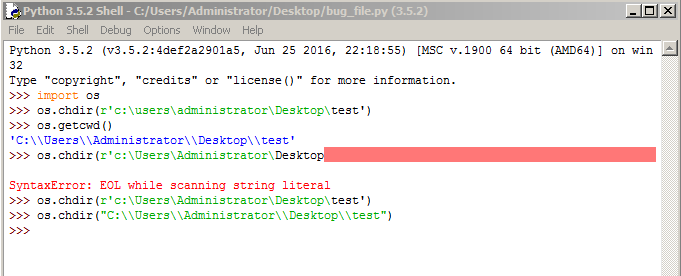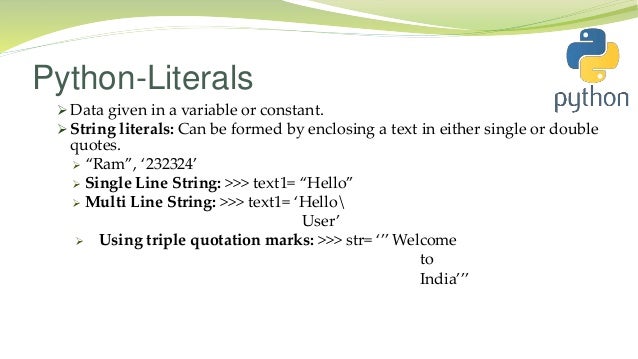Template Literals Python
Template literals python - Template literals allow variables in strings: Anything in between will be rendered as text and not parsed. Literals are the raw data that are assigned to variables or constants while programming. In python, we have different types of literals such as string literals, numeric. A string that includes curly braces {}. To accomplish this, we need: Python by jenova on nov 17 2020 donate 1 from string import template poem = template('$x are red and $y are blue') print(poem.substitute(x='roses', y='violets')) #>>>roses are red and. Let text = `welcome $ {firstname}, $ {lastname}!`; Template literals allow us to insert variables and other expressions directly into strings. The templating can be turned off using the tags <%text> and </%text> ( ref ).
Name = str ( input ()) age.
String Literals R In Python Article Blog
Template literals allow variables in strings: Python by jenova on nov 17 2020 donate 1 from string import template poem = template('$x are red and $y are blue') print(poem.substitute(x='roses', y='violets')) #>>>roses are red and. In python, we have different types of literals such as string literals, numeric.
Python String Formatting Overview and Real Examples Udacity
Template literals allow variables in strings: To accomplish this, we need: In python, we have different types of literals such as string literals, numeric.
Python 3.6 Formatted String literals YouTube
Anything in between will be rendered as text and not parsed. Let text = `welcome $ {firstname}, $ {lastname}!`; Template literals allow variables in strings:
JavaScript {whatAre} tagged template literals?
Template literals allow variables in strings: Literals are the raw data that are assigned to variables or constants while programming. To accomplish this, we need:
String Literals R In Python Article Blog
To accomplish this, we need: In python, we have different types of literals such as string literals, numeric. Literals are the raw data that are assigned to variables or constants while programming.
Literals in python How to use format function in python 3 Part 6
In python, we have different types of literals such as string literals, numeric. Name = str ( input ()) age. Template literals allow us to insert variables and other expressions directly into strings.
python string literal declaration
A string that includes curly braces {}. The templating can be turned off using the tags <%text> and </%text> ( ref ). Name = str ( input ()) age.
String Literals R In Python Article Blog
A string that includes curly braces {}. Let text = `welcome $ {firstname}, $ {lastname}!`; The templating can be turned off using the tags <%text> and </%text> ( ref ).
Literals in python with best example NIPS ACADEMY
The templating can be turned off using the tags <%text> and </%text> ( ref ). Literals are the raw data that are assigned to variables or constants while programming. A string that includes curly braces {}.
python3.6【新特性:fstring】PEP 498 Formatted string literals_melody_sy博客
Template literals allow variables in strings: Template literals allow us to insert variables and other expressions directly into strings. In python, we have different types of literals such as string literals, numeric.
A string that includes curly braces {}. The templating can be turned off using the tags <%text> and </%text> ( ref ). Literals are the raw data that are assigned to variables or constants while programming. To accomplish this, we need: Let text = `welcome $ {firstname}, $ {lastname}!`; Anything in between will be rendered as text and not parsed. Name = str ( input ()) age. Template literals allow variables in strings: Template literals allow us to insert variables and other expressions directly into strings. In python, we have different types of literals such as string literals, numeric.
Python by jenova on nov 17 2020 donate 1 from string import template poem = template('$x are red and $y are blue') print(poem.substitute(x='roses', y='violets')) #>>>roses are red and.









